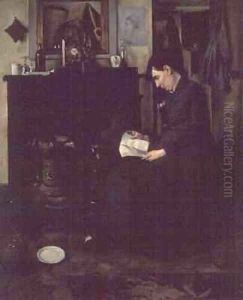Louis Bouchet Paintings
Louis Bouchet was a French painter, born in 1817 and passed away in 1906. His life spanned a period of significant transformation in the art world, from the late Romantic era into the beginnings of Modernism. However, despite the dynamic times in which he lived, Bouchet remains a relatively obscure figure in art history, overshadowed by his contemporaries and the burgeoning movements of Impressionism and Post-Impressionism that dominated the latter part of the 19th century.
Bouchet's work primarily focused on portraiture and genre scenes, capturing the nuances of French society with a delicate realism that was characteristic of the period before the full emergence of Impressionism. His technique and style were deeply influenced by the academic art teachings of the École des Beaux-Arts in Paris, where he likely received his training. This institution was renowned for its rigorous instruction in the traditional methods of drawing and painting, emphasizing classical subjects, and Bouchet's work reflects this foundation.
Throughout his career, Bouchet exhibited his work in various salons and galleries, gaining modest recognition among art collectors and his peers. His portraits, often of notable figures and everyday citizens alike, were praised for their intricate detail and the ability to capture the essence of the sitter. Despite his skills and contributions to the French art scene, Bouchet did not achieve the same level of fame or lasting influence as some of his contemporaries, such as Claude Monet or Edgar Degas, whose experimental approaches to painting would come to define the era.
After his death in 1906, Louis Bouchet's paintings continued to be appreciated by a niche group of art enthusiasts and collectors, but he has yet to receive widespread recognition in the broader narrative of 19th-century art. In recent years, there has been a growing interest in rediscovering and re-evaluating artists like Bouchet, who played a role in the rich tapestry of art history but have remained outside of the main spotlight. As scholarship expands to include a wider range of artists and influences, Bouchet's work offers valuable insights into the transitional period of French art, bridging the gap between the academic traditions of the past and the innovative impulses of the modern era.
